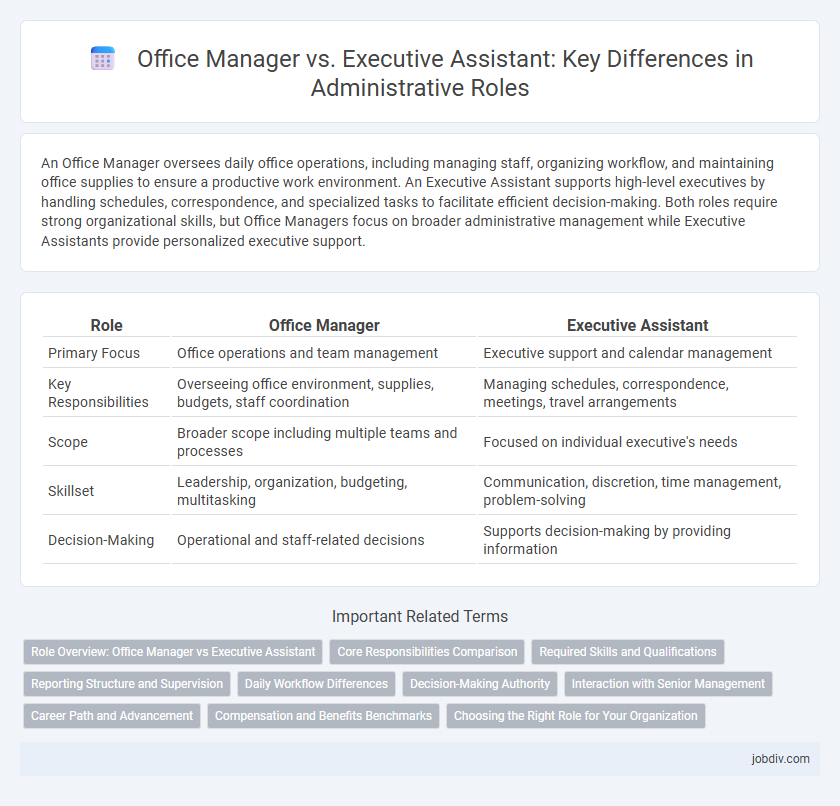An Office Manager oversees daily office operations, including managing staff, organizing workflow, and maintaining office supplies to ensure a productive work environment. An Executive Assistant supports high-level executives by handling schedules, correspondence, and specialized tasks to facilitate efficient decision-making. Both roles require strong organizational skills, but Office Managers focus on broader administrative management while Executive Assistants provide personalized executive support.
Table of Comparison
| Role | Office Manager | Executive Assistant |
|---|---|---|
| Primary Focus | Office operations and team management | Executive support and calendar management |
| Key Responsibilities | Overseeing office environment, supplies, budgets, staff coordination | Managing schedules, correspondence, meetings, travel arrangements |
| Scope | Broader scope including multiple teams and processes | Focused on individual executive's needs |
| Skillset | Leadership, organization, budgeting, multitasking | Communication, discretion, time management, problem-solving |
| Decision-Making | Operational and staff-related decisions | Supports decision-making by providing information |
Role Overview: Office Manager vs Executive Assistant
Office Managers oversee daily administrative operations, including facility management, staff coordination, and office budget tracking, ensuring organizational efficiency. Executive Assistants provide high-level support directly to executives, managing schedules, communications, and confidential projects to facilitate strategic decision-making. Both roles require strong organizational skills, but Office Managers focus on broader office functionality, while Executive Assistants concentrate on personalized executive support.
Core Responsibilities Comparison
Office Managers oversee daily administrative operations, manage office supplies, coordinate facility maintenance, and supervise support staff to ensure smooth business functions. Executive Assistants provide high-level administrative support to senior executives, including managing calendars, preparing reports, handling confidential communications, and organizing meetings. While Office Managers focus on overall office efficiency, Executive Assistants prioritize executive-specific tasks and strategic support.
Required Skills and Qualifications
Office Managers require strong organizational skills, proficiency in office software, and experience in team management to oversee daily operations effectively. Executive Assistants need advanced communication abilities, high-level discretion, and expertise in scheduling complex calendars to support executives efficiently. Both roles demand problem-solving capabilities and adaptability, but Executive Assistants often require specialized knowledge in corporate protocols and executive-level support.
Reporting Structure and Supervision
Office Managers typically oversee administrative staff and report directly to senior management or department heads, ensuring smooth day-to-day operations. Executive Assistants usually report to high-level executives like CEOs or CFOs, managing their schedules and communications without formal supervisory responsibilities over other staff. The distinction in reporting structure reflects Office Managers' broader supervisory roles compared to Executive Assistants' focused support functions.
Daily Workflow Differences
Office Managers oversee daily administrative operations, coordinating office resources, managing staff schedules, and ensuring efficient workflow across departments. Executive Assistants focus on supporting top executives by handling calendar management, preparing reports, and facilitating communication with internal and external stakeholders. While Office Managers concentrate on broader office logistics, Executive Assistants prioritize personalized executive support and strategic task management.
Decision-Making Authority
Office Managers typically hold broader decision-making authority, overseeing administrative operations, managing budgets, and implementing office policies to ensure efficiency. Executive Assistants often make critical decisions related to scheduling, communication, and executive support, directly influencing the productivity of senior leaders. The scope of decision-making for Office Managers is generally strategic and operational, while Executive Assistants focus on tactical and immediate priorities.
Interaction with Senior Management
Office Managers coordinate daily operations and directly oversee administrative staff, ensuring smooth office functions. Executive Assistants provide high-level support by managing schedules, communications, and confidential information for senior executives. Both roles require strong interaction with senior management, but Executive Assistants maintain closer, more strategic relationships to facilitate decision-making and project execution.
Career Path and Advancement
Office Managers typically advance by moving into senior administrative roles or operations management, leveraging skills in team leadership and organizational efficiency. Executive Assistants often progress towards executive-level positions such as Chief of Staff or executive leadership roles, benefiting from close collaboration with senior management and strategic project involvement. Both career paths require strong communication, multitasking, and problem-solving abilities, but differ in scope and exposure to organizational decision-making.
Compensation and Benefits Benchmarks
Office Managers typically earn between $50,000 and $70,000 annually, with benefits packages including health insurance, retirement plans, and paid time off aligning with administrative industry standards. Executive Assistants often command higher salaries ranging from $60,000 to $85,000 due to increased responsibilities, along with enhanced perks such as performance bonuses, executive-level health benefits, and professional development allowances. Compensation and benefits benchmarks indicate Executive Assistants receive more comprehensive packages reflecting their critical support roles in leadership environments.
Choosing the Right Role for Your Organization
Selecting the right administrative role depends on your organization's specific needs for leadership and support. An Office Manager oversees daily operations, facilities, and staff coordination, ensuring an efficient workplace environment, while an Executive Assistant provides high-level support to executives, managing schedules, communications, and strategic tasks. Evaluating workload, organizational structure, and priority areas will determine whether an Office Manager or Executive Assistant best aligns with your business goals.
Office Manager vs Executive Assistant Infographic

 jobdiv.com
jobdiv.com